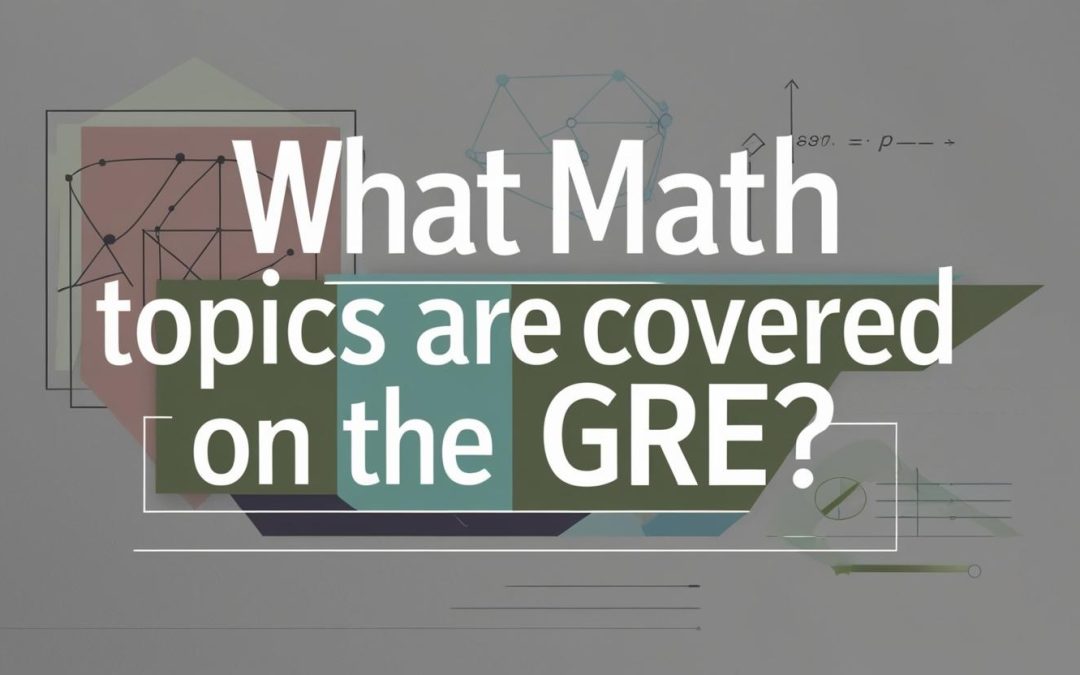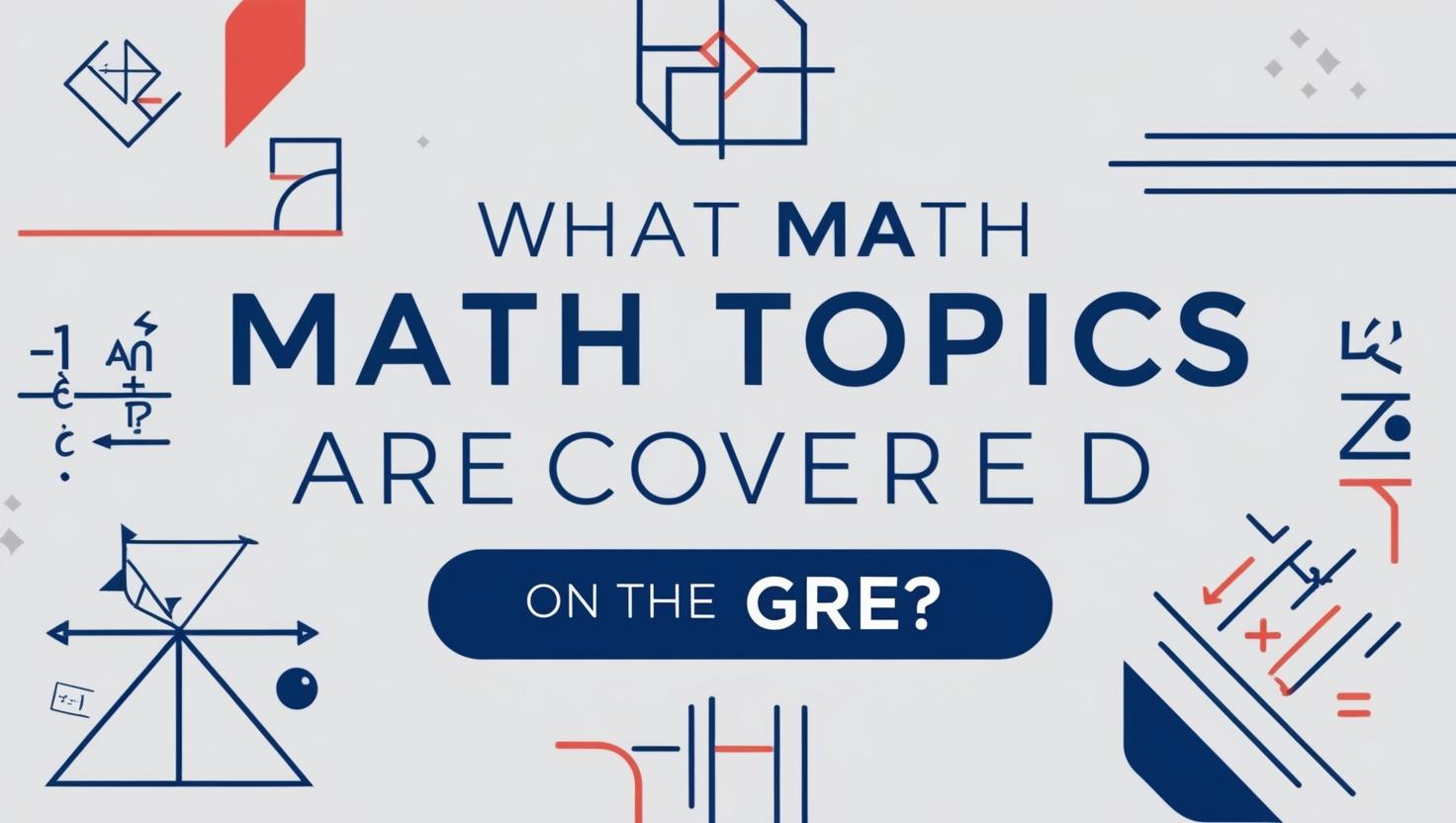Hey there, future GRE rockstar. If you’re gearing up to take the GRE and wondering, “What math topics are covered on the GRE?” you’ve landed in the perfect spot. At TakeMyGREExam.com, we’re all about making your GRE prep feel less like a chore and more like a fun challenge you’re ready to crush. The Quantitative Reasoning section of the GRE can seem intimidating at first, but don’t worry we’ve got your back with this friendly breakdown of the math topics you’ll need to master. Let’s dive in and get you excited about tackling that exam.
Why the GRE Math Section Matters
The GRE isn’t just about proving you’re a math genius it’s about showing grad schools you’ve got the problem-solving skills to thrive. The Quantitative Reasoning section tests your ability to think logically, work with numbers, and apply basic math concepts to real-world scenarios. Whether you’re a math whiz or someone who hasn’t touched a calculator since high school, understanding the topics covered is the first step to success. And trust us, with a little prep, you’ll be ready to shine.
The Big Four: Core Math Topics on the GRE
The GRE Quantitative section focuses on four main areas: Arithmetic, Algebra, Geometry, and Data Analysis. Think of these as your trusty toolkit for solving the puzzles the GRE throws your way. Here’s what you’ll encounter in each:
1. Arithmetic
This is your bread-and-butter math think back to the basics. You’ll see questions on integers, fractions, decimals, percentages, ratios, and exponents. Ever wondered how to calculate a 20% tip in your head? That’s the kind of practical number-crunching the GRE loves. Don’t stress if you’re rusty; a quick refresher will have you zipping through these in no time.
2. Algebra
Time to channel your inner equation-solver. Algebra on the GRE includes solving linear equations, working with inequalities, factoring, and tackling quadratic equations. You’ll also see some word problems that ask you to translate real-life situations into math. It’s like a little detective game find the clues, set up the equation, and boom, you’ve got the answer.
3. Geometry
Shapes, angles, and measurements, oh my! Geometry questions cover triangles, circles, squares, and coordinate planes. You’ll need to know formulas like the area of a circle (πr²) or the Pythagorean theorem (a² + b² = c²). Don’t worry about advanced calculus or trigonometry the GRE keeps it simple and sticks to the essentials.
4. Data Analysis
Get ready to play with numbers in a whole new way. This section tests your ability to interpret charts, graphs, and tables. You’ll tackle mean, median, mode, probability, and basic statistics. It’s like being a data detective spot the trends, crunch the numbers, and pick the right answer. If you’ve ever analyzed your streaming habits to pick a show, you’ve got a head start.
What Makes GRE Math So Catchy?
Here’s the fun part: the GRE isn’t about memorizing endless formulas or doing calculus in your sleep. It’s designed to test your reasoning skills, not just your math chops. You’ll see multiple-choice questions, numeric entry problems, and quantitative comparisons that ask you to think creatively. Plus, you get an on-screen calculator (no need to dust off that old graphing one from high school). The variety keeps it fresh, and with practice, you’ll start spotting patterns that make solving these problems a breeze.
How TakeMyGREExam.com Can Help You Shine
At TakeMyGREExam.com, we’re here to turn your GRE prep into a winning game plan. Our expert resources break down every math topic with easy-to-follow explanations, practice questions, and insider tips. Whether you need a crash course in algebra or a geometry refresher, we’ve got the tools to boost your confidence and your score. Why stress when you can prep smart with us?
Friendly Tips to Master GRE Math
– Practice, Practice, Practice: The more you work through sample questions, the more comfortable you’ll get.
– Brush Up on Basics: Spend a little time reviewing formulas and concepts it’s like warming up before the big game!
– Think Like the Test: The GRE loves to trick you with sneaky wording, so read carefully and double-check your work.
– Time It Right: With 35 minutes per section, pacing is key. Practice under timed conditions to build your speed.
Ready to take on the GRE Quantitative section? With the right prep, you’ll be walking into test day feeling like a math superhero. Visit TakeMyGREExam.com today and let’s get started on your path to GRE greatness!
FAQs About GRE Math Topics
Q: Do I need to be a math expert to do well on the GRE?
A: Nope! The GRE tests high school-level math with a twist of reasoning. If you can handle the basics and think on your feet, you’re golden. We’ll help you fill in any gaps at TakeMyGREExam.com.
Q: Are there any advanced topics like calculus on the GRE?
A: Good news no calculus or trigonometry here. The GRE sticks to arithmetic, algebra, geometry, and data analysis. It’s all about practical, everyday math skills.
Q: How much time do I get for the Quantitative section?
A: You’ll have 35 minutes for each of the two Quantitative sections, with about 20 questions each. It’s a sprint, not a marathon practice pacing with us.
Q: Can I use a calculator on the GRE?
A: Yep. The GRE provides an on-screen calculator. It’s basic but super handy for saving time on tricky calculations.
Q: What if I’m rusty on math? How do I start prepping?
A: Start with the basics review key concepts like fractions or exponents. Then, head to TakeMyGREExam.com for tailored practice that’ll get you up to speed fast.
Q: Are word problems a big part of the GRE?
A: You bet. Word problems pop up in algebra and data analysis, testing how you apply math to real-life scenarios. We’ve got tons of examples to practice with.
Let’s Get You GRE-Ready.
So, what math topics are covered on the GRE? Arithmetic, algebra, geometry, and data analysis nothing you can’t handle with a little help from your friends at TakeMyGREExam.com. We’re here to make your prep fun, friendly, and totally doable. Sign up today, and let’s turn those math worries into a winning score. You’ve got this.


